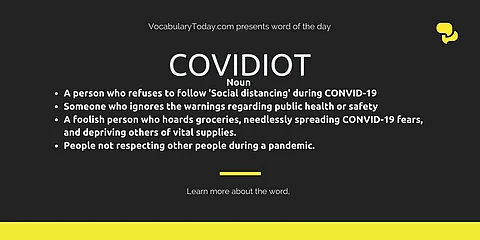

The whole world is discussing the Coronavirus outbreak and its devastating impact on countries across the globe. Almost every day we come across many medical terms and words and phrases associated with the COVID-19 (Coronavirus disease -19). The Latin word ‘corona’ means ‘crown’. The virus is called ‘corona’ because of its crown-like shape and spikes.
In the wake of the Coronavirus outbreak, to define new situations new words have been coined and they are widely used on social media. Here are two meaningful such words: i) Covidiot, and
ii) Covidient.
We can easily guess the meanings of the two portmanteau words. Covidiot is a combination of ‘coronavirus’ and ‘idiot’ and it refers to a person who does not follow the directives and orders such as ‘social distancing’ and behaves like an idiot. Covidient is a combination of ‘coronavirus’ and ‘obedient’. Urbandictionary.com, which coined the word ‘Covidiot’ defines it as “someone who ignores the warnings regarding public health or safety”. Here are examples of how the word is used in sentences:
• #SocialDistancing alone can help containing @coronavirus. I don’t know why #covidiots don’t understand it.
• Tell the covidiots not to take medicine without consulting doctors.
Unlike covidiots, covidients are people who strictly follow the directives and orders of the government during the Coronavirus outbreak. Examples:
• Thanks to numerous covidients, the curfew was successful.
• We are all covidients and we will cooperate with the government.
The words ‘self-quarantine’ and ‘self-isolate’ are intransitive verbs and they are some of the most frequently used words in many FB posts, comments, news stories and reports. Examples:
• As the Coronavirus spreads fast, all those who have returned from foreign countries have been asked to self-quarantine to contain the outbreak.
• Since you had contact with those who returned from Italy, you need to self-isolate for two weeks.
Thanks to social media, we are familiar with words such as lockdown, epidemic, pandemic, superspreader, self-isolation, self-quarantine, and word chunks (collocations) such as social distancing, community spread, cordon sanitaire, droplet transmission, flattening the curve, tsunamis of COVID-19 cases, emerging disease, solitary confinement, animal-human interface, incubation period, contain the outbreak and viral shedding.
Who are super-spreaders? They are a small group of people of about one in five who transmit infections to far more people than the majority do. It is believed that super-spreaders may not be good at suppressing the virus because of their immune system.
‘Flattening the curve’ refers to isolation measures taken by a community, region or country to keep the daily number of disease cases at a manageable level.
•“For many countries staring down, fast-rising coronavirus case counts, the race is on to “flatten the curve.”
The term ‘cordon sanitaire’ refers to the restriction of movement of people into or out of a defined geographic area.
In the news story below, there are useful word chunks.
Don Giuseppe Berardelli, a 72-year-old Italian priest, died from the COVID-19 after declining to use a ventilator that his parishioners bought for him so that a younger patient could use it instead. The priest, well known for his charity work and compassion, was praised on social media after the news of his apparent sacrifice began to surface. Shortages of ventilators have become apparent around the world as the virus continues to spread. With the number of new cases growing dramatically each day, experts worry that the health care system will soon be overwhelmed, and the limited number of ventilators could pose serious problems.
Becoming familiar with collocations such as ‘die from something’, ‘die of something’, ‘become apparent’, ‘grow dramatically’, ‘pose problems’ can help learners of English learn the language meaningfully and use words appropriately.
